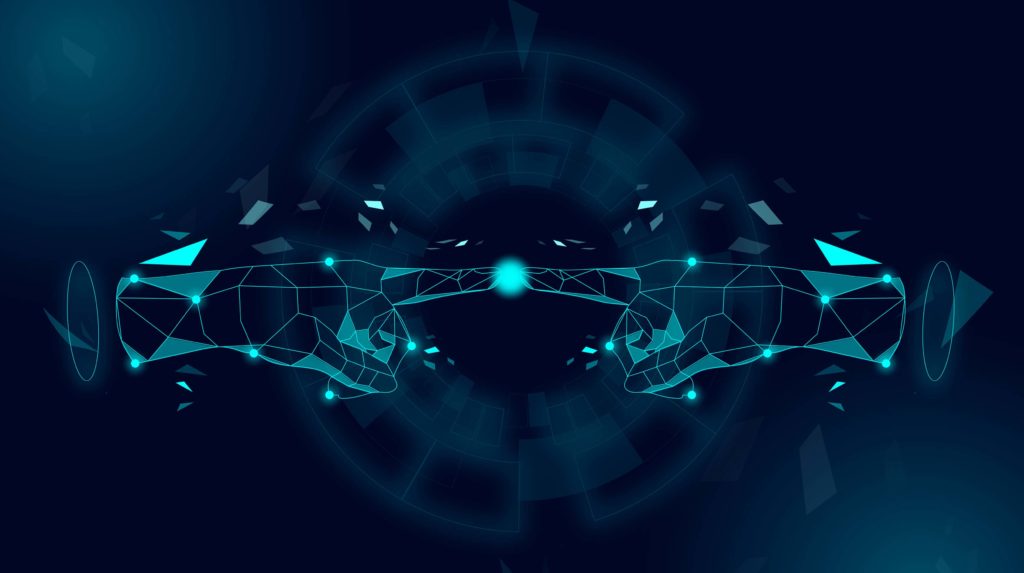
The “global community” of technological culture and innovation, established in 2008 by Ray Kurzweil and Peter Diamandis in NASA Research Park, Silicon Valley, is a booster of food for thought and reflections in scientific and technological communities, to undertake new process and product development opportunities that can share in the knowledge growth and in creating new business chances.
Michele Rossi
One thousand of enthusiasts were glued to the big screen of the recent two-day Singularity Italy Summit 2018, held at MiCo – Milano Convention Centre, on the theme of future scenarios. Lovers of all professional categories, innovators, scientists, researchers, economists, managers and thinkers, interested in the development of our Country according to a progressive transformation that deems innovation the unique powerful driving engine able to generate growth and prosperity. Magically glued for two days, listening to “visionaries”. It might not have been otherwise, due to the rich panel of experts from various nations, committed to illustrating the exponential technologies expected to give the economic, social and costume accelerations that will characterize next years. In an age in which changes with unprecedented dynamics are pervading, and partly revolutionizing, almost any of our work and life modalities, in which our lives must be shaped to accept the new challenges issued by technologies and new business models, also the launch of the first Italian Faculty, contextually presented , had the meaning of an educational accompanying course to face the future with awareness, always updated, of the changes and of the need of playing an active and participatory role in it. The “global community” of technological innovation and culture, established in 2008 by Ray Kurzweil and Peter Diamandis in NASA Research Park, Silicon Valley, is a booster of food for thought and reflections within scientific and technological communities, to activate new product and process development opportunities that can contribute in the knowledge growth and in creating new business chances. There is, however, something more. All this is framed in a philosophic scenario that sees the whole Society as a good to be preserved in a totalizing holistic vision oriented to the constant improvement of its wellbeing. According to this vision, benefitting from these technologies, as well as the responsibility for their better use to the end of life quality and planet protection, involves everybody to the same extent.
The challenge of robotics
However, robotics urges and on MICO stage, among very colourful spots and special effects on the big screen, appears a challenge, or better a collaboration: the one between the pianist and the acoustic DiskLavier piano equipped with electronic sensors. A four-hand challenge, “human” protagonist Roberto Prosseda, on a Yamaha Music piano. A very pleasant two-piano concert played on a single piano, which can be used for live executions and for automatic playback. Not only a ludic experiment, even if Prosseda acted as a playful actor, as well as a talented pianist, but also a demonstration of the performance characteristics of the “human” pianist, always creative in touch and interpretation, compared to the programmed piano, technically perfect, error-free but also without a soul.
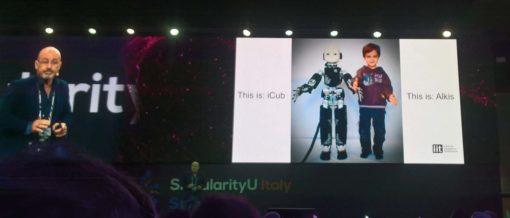
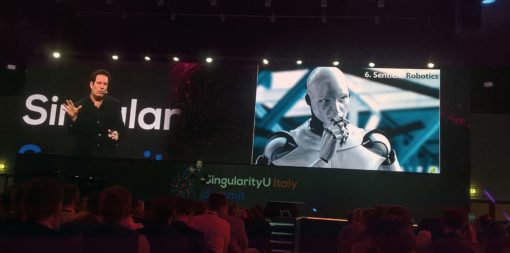
Disaster medicine
Among the several topics treated during the Summit, we are mentioning some. Eric Rasmussen, physician, with master in disaster medicine, of which is also trainer, research professor in environmental safety and global medicine, personality with a thriving acknowledged international activity. Topics concerning global health and safety, particularly felt in determinate Regions in the world where conflicts and migrations take place. An impressive datum: in 2040, people who will be compelled to leave their homes will be 60 a day, 365 days a year. These 60 people will need water, food and a shelter but they will also need to be identified to guarantee their identity, all over the world. The various receiving Countries will face problems, too, in the difficult task of meeting urgent needs and also the eventual manifestations of delinquency that necessities induce to carry out. They will worsen the global situation, the climatic change, drought and epidemics. In spite of that, the average life is drastically increasing, also because wars and disasters are causing fewer deaths in the world. Besides, the rising use of clean energies and water purification, with decreasing costs. Finally, the availability of GPS, which allow identifying rapidly the zones where disasters, earthquakes or hurricanes are taking place.
New business models….
Eric Ezechieli, entrepreneur who studies the modalities to speed up significantly the evolution of business paradigms, to determine a durable and shared positive impact. Strong supporter of the B-Corp movement, which sustains the need of a new business course oriented to the “Benefit Corporation” philosophy. A movement that is attracting proselytes worldwide and in Italy it has achieved the approval of a law for a new juridical formula, the “benefit company”, characterized by high standards of targets, transparency and responsibility. In the opinion of Ezechieli, the B-Corp philosophy leads entrepreneurs back to their original mission of producing benefits and constant innovation for themselves, the entire community and the environment, thus allowing them to establish the best balance between profit and mission.
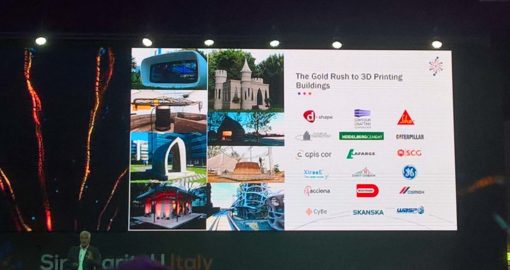
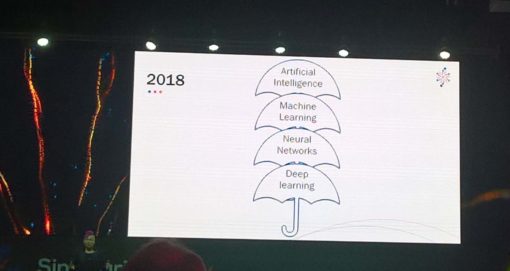
…and food ones
Mark Post, physiologist, professor of tissue Engineering and medicine, creator of the first specimen of hamburger in the world produced in lab starting from beef stamina cells, illustrated the course that led him to the “new way” for the hamburger. Growth of the world population, more and more unsustainable production models, vegetal-based diets as widely accepted solution but no so broadly implemented for various reasons. Finally, the ascertainment animal proteins are a healthier protein source than legumes. The impossibility of going on consuming meat with the same rate, owing to environment and balanced diet reasons. Palpable in the world the growing concern for the wellbeing of bred animals and they type of feeding. Hence, the growing interest in the promising technology of meat “in vitro”, called with the trendy name of “Cellular agriculture”. Stamina cell technology is the most recent and, even if the effective production cost of a hamburger in a Petri capsule is too high to promise a contribution to food safety, costs are expected to drop drastically. This means the global meat market will be notably interrupted by this new product.
What is the work direction?
On the work future, Alain Dehaze, CEO of Adecco, states he is “realistically optimist”. Certainly, it is known we will need new competences, data scientists, cyber-security experts, developers and programmers and so on. The issue is understanding whether we will be able to create new business types, employment and adequate training for the new requirements. However, a change is necessary: if world educational systems and schools have demonstrated their inadequacy to keep pace with the evolution that the technological development is dynamically carrying on, it is necessary that education is managed by enterprises. The turning point should start from the enhancement of more collaboration among companies, educational system players and institutions. Target, creating a virtuous eco-system able to educate the true competences needed by the market. Hod Lipson, professor of Engineering and Data Science, expert of robotics, self-aware car and self-replicating car is a roboticist who works in the sectors of artificial intelligence and digital manufacturing. In collaboration with his students, he designs and implements robots, so to speak anomalous, in terms of functions: self-replication, creativity and self-reflection. The boost is strong and the questions that arise are disturbing: will robots be able to design and to manufacture other robots? Can robots have curiosity and creativity? Will robots ever be really aware of themselves? We leave any other reflection to readers.
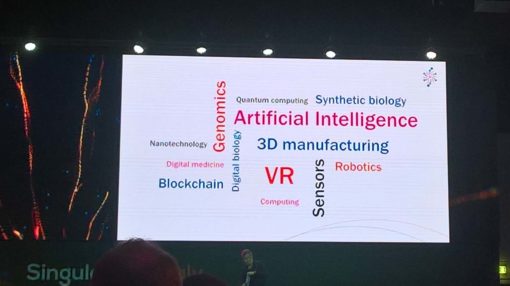
Robotics, block-chain, AI: the new horizons
The Norwegian Anita Schjoll Brede, a very extroverted and positively transgressive personality, who starts from the theatre and becomes CEO and co-founder of IRIS.AI, one of the 10 most innovative start-ups of Artificial Intelligence in 2017, a virtual research assistant based on AI, able to read, to select and to connect scientific notions for the academic and industrial research world. Fundamental target: democratizing the access to science. David Orban, experts in nets, block-chains and with his own vision on exponential technologies that are pervading the world: a revolution compared to the past technological linearity. Finally, but just to know, a relevant place for some of the most interesting Italian visionaries, spearheads of the peculiar Made in Italy features. Enrico Dini, automation and robotics engineer, founder of D-Shape, the first who has created a 3D printed house, i.e. spreading 5 mm-thick sand layers one on top of the other, bonded by an ecologic glue that transforms them into a composite material resembling rock. The millimetre reproduction of very complex shapes in a stone monolith paves the way to endless implementation potentialities of constructions that seem to envisage wide creativity combined with low-cost manufacturing. Open-stage applauses for Roberto Cingolani, dad of i-Cub, the kid robot, director of the Italian Institute of Technology in Genoa, after the movie on Hannes, the prosthesis of poly-articulated robotic hand with myoelectric control realized by the joint laboratory Rehab Technologies IIT -INAIL, fruit of the collaboration between IIT and Inail Prosthesis Centre in Budrio. Roberto Cingolani, who has already established and signed the Institute’s targets with validity until 2023, i.e. prosecuting the activity carried out until now in the fields of robotics, of computational science, of nano-materials and of sciences for life, and for each of these fields a series of goals: companion robots, which can support man at home and at work, graphene, nano-medicine, the new artificial intelligence instruments for the data analysis and processing and still much more. The prosthetic hand can restore some lost functions in people with arm amputation exceeding 90% and it is characterized by the peculiar adaptive grip, which allows grasping the objects suiting their shape and withstanding eventual external stresses, pursuing the target of replicating gestures and functions of the natural limp. Applauses greeted the movie of a patient provided with Hannes, on the right arm, almost indistinguishable from the other hand, committed to cleaning a table, with fully “human” handling. Then Salvatore Iaconesi and Oriana Persico, the first robotic engineer, hacker and scholar of the advent of ubiquitous networks and technologies; the second sensible writer, expert in communication, digital inclusion and cyber-ecologist, who promotes her own vision of the world, with arts as powerful bonding agent among sciences, politics and economics. “Ubiquitous technologies” embrace from Social Networks to Internet of Everything. The “Community” stemming from it tries to understand whether each object surrounding us is connected, what happens to data, especially very sensitive ones, like bio-data generated by our bodies, to whom these remote monitorable and controllable objects really belong, how the property concept changes, what new scenarios, conflicts and possibilities emerge. What instruments we have got, as people and citizens, to express our opinions actively about the use modalities we want for these data?
Finally, anyway, we cannot neglect the initiative “Seniors Impact Initiative”, a mini-summit reserved to the Over 60 with the goal of making them approach technologies that are already improving our life. Two intense days for all, adults and children, with exchange of opinions among participants, astride hopes, doubts and opportunities.



